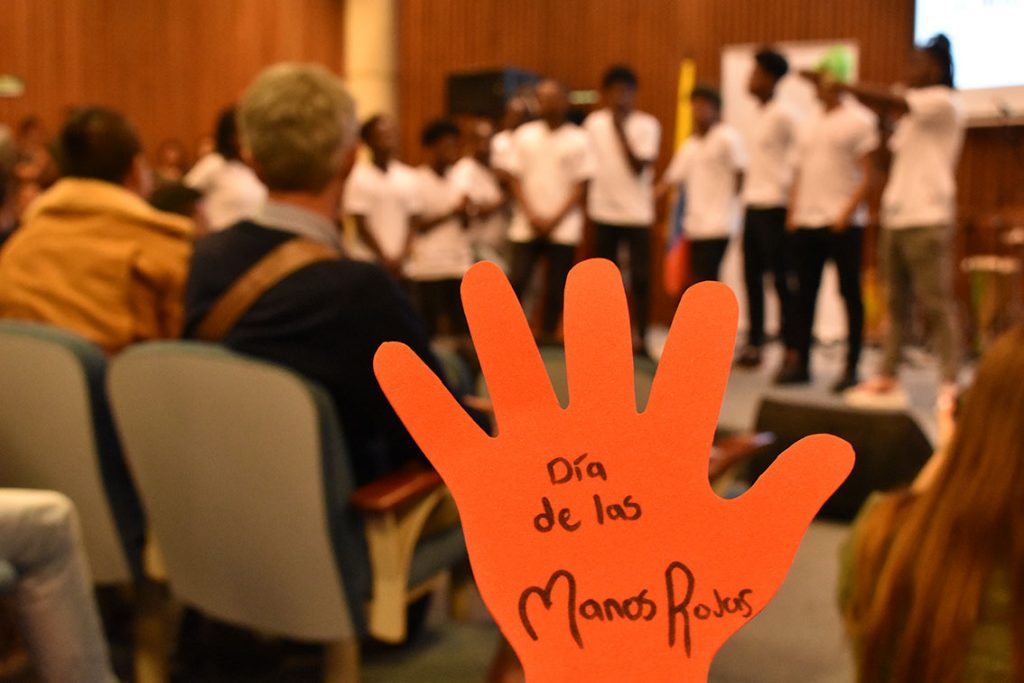Paren: A Call to Stop Forced Recruitment of Children to War and Conflict in Colombia
On February 12, 2021, the Mennonite Center for Justice, Peace, and Nonviolent Action, better known as Justapaz, joined forces with other Colombian and international organizations in a campaign called “World’s Red Hands Day.” This campaign seeks to enforce a pact for prevention and non-repetition of violations against children and adolescents in armed conflicts and related violence. Justapaz signed a public statement by dozens of organizations and participated in several activities that day, claiming to eliminate forced recruitment for children as weapons of war and violence. The Optional Protocol to the Convention on the Rights of Children regarding children’s participation in armed conflicts (OPAC for its acronym in English) was approved and signed by 150 governments of countries worldwide and hundreds of social organizations 19 years ago. The social organizations and entities that signed the Statement drew attention to violations of children’s rights and adolescents in Colombia due to continued armed conflict and violence amid the COVID19 pandemic. Here are some of the aspects quoted out of the Statement:
“An approach to the reality of children and adolescents in Colombia
The closure of educational institutions, the intensity of the various armed groups operating in the country, and the grave humanitarian crisis that the general population is experiencing have been the scene of multiple human rights violations and infringements of the law—international humanitarian aid against children and adolescents. According to the records of the Observatory for Children and Armed Conflict of COALICO (acronym in Spanish for the Coalition against entailment of children and adolescents to the armed conflict in Colombia), at least 79 events were affecting approximately 222 children and adolescents last year. They were victims or at risk of being victims due to the use and recruitment by armed actors.
That happened even though the Ombudsman’s Office issued an average of 23 early warnings for the past year. That Office reported a persistent risk of recruitment in Antioquia, Caquetá, Cauca, Chocó, Meta, Nariño, Valle del Cauca, and Putumayo. It also took place amid the “Súmate por mí” (Add yourself to support me) campaign carried out by the Colombian Government in July last year. The Presidential Council for Human Rights and International Affairs was supposed to prevent recruitment in 86 prioritized municipalities. In the latter case, it is hoped that it will be an opportunity to identify and strengthen the lines or actions provided in the national plan and in the local programs to prevent these violations. That could effectively reduce the risk and commission of children and adolescents’ recruitment and use by the different armed actors.
According to the records of the Office of the United Nations High Commissioner for Human Rights in 2020, at least 24 girls and boys were killed in the massacres perpetrated in the country by armed groups.
On the other hand, forced displacement, confinement, and the denial of humanitarian access became part of the effects that continued during the last year. Thus at least 25,366 Colombians were victims of forced displacement in at least 94 registered events by the United Nations Office for the Coordination of Humanitarian Affairs of the UN (OCHA). From the ONCA of COALICO, information was recorded that shows that at least 5,742 girls, boys, and adolescents were victims of this situation in 45 monitored events. The departments where this situation occurred with greater intensity were Antioquia, Cauca, Chocó, Nariño, and Valle del Cauca.
Attention is drawn in a particular way to the affectations of the nature mentioned above that victimize girls, boys, and adolescents of indigenous and Afro-descendant communities. It is also crucial to take comprehensive measures, with a community approach, emphasizing this population’s particularities, to address the risks they face avoiding actions with damage.
COVID-19 and confinement situations limit the humanitarian response in conflict contexts. It increases the risks for children such as recruitment, events generated by mines, and sexual violence, around schools, affecting these communities’ references as safe spaces. The fear of using these spaces by non-educational actors and the damage to school infrastructure can prevent a safe return to school and postpone learning.
This is a complex panorama. There is a need to take up the spirit and obligations contained in the OPAC. The Protocol not only calls on States to comply, recognize, and take actions to guarantee the rights of girls, boys, and adolescents in their territory. It also insists on eliminating and prohibiting all activities related to recruitment and/or involvement in any action related to armed conflicts. The Colombian State must reaffirm its commitment to promote all efforts within its reach to protect childhood and adolescence in Colombia from the consequences of this population’s participation in the armed conflict. Finally, preventing these situations from continuing to occur will reduce these violations. There is no need for repetition of violence in the country.
A proposal
According to what was said before, our red hands this year join by saying ¡PAREN! (STOP!) We urge all co-responsible actors, particularly the Colombian State, to work for a country in which the Pact for preventing the non-repetition of violations against children and adolescents in the armed conflict and related violence a common objective. And the constant commitment to the validity of the rights of children and adolescents in the following steps:
PROTEGIENDO A LA NIÑEZ Y LA ADOLESCENCIA DEL CONFLICTO ARMADO Y TODO TIPO DE VIOLENCIAS
(Protecting children and adolescents from armed conflict and all kinds of violence)
APRENDIENDO DE SUS SABERES
(Learning from their knowledge)
RESPETANDO SUS INTERESES
(Respecting their interests)
ESCUCHANDO SUS INQUIETUDES Y ATENDIENDO SUS PROPUESTAS
(Listening to their concerns and providing for their proposals)
NIÑAS, NIÑOS Y ADOLESCENTES FUERA DE LA GUERRA
(Girls, boys, and adolescents out of the war)
Signatories of the Statement:
40 Colombian organizations and 10 International organizations.

